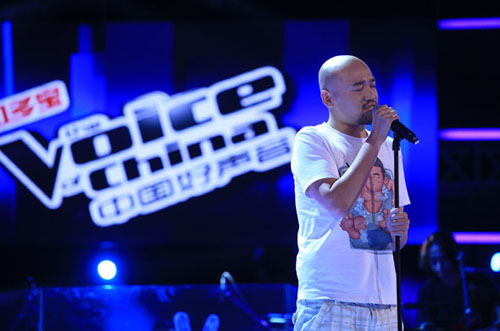"The Voice of China", China's adaptation of a Dutch reality talent show, sees its hopeful contestants going through a blind audition, with four celebrity judges/coaches picking their teams of singers who will then go on to compete for a recording contract and a highly publicized concert performance.
The show turned out to be an unexpected success, especially at a time when the TV market is basically oversaturated due to the large numbers of reality talent shows similar to western programs that are coming to viewers on a daily basis, like "American Idol," "X-Factor" and "You've Got Talent."
As the NBC show secured Christina Aguilera, Cee Lo Green, Blake Shelton and Adam Levine as its four U.S. celebrity coaches, Zhejiang Satellite TV managed to lure Chinese celebrities such as renowned musician Liu Huan -- who sang the Beijing Olympics theme "You and Me" with Sarah Brightman -- and pop diva Na Ying, mainland singer Yang Kun and Taiwan singer-songwriter Harlem Yu to come on as the show's coaches.
When the production team first approached Na Ying and Liu Huan, both were unwilling to appear on the show. Producer of Zhejiang TV's "The Voice of China" Tian Ming said: "The two simply refused. They did not want to participate in any kind of talent show."
 |
| A singer performs at the stage of "The Voice of China". [China.org.cn] |
Before all of the abovementioned gets onto the screens across the nation, there are 6 blind auditioning shows. Each of the four coaches/judges has the length of the auditioner's performance to decide whether or not he or she wants that singer on his or her team; if two or more judges want the same singer, the singer has the final choice of coach. They can never judge by looks or styles as every judge sits with their back towards those auditioning. The judges can only decide based on vocal performances and if they hear something they like, they hit a button and turn around to see the person singing.
This format has never before been seen on any Chinese TV show and its producers make it one of the most heartwarming and story-telling shows ever when they show the coaches interacting with auditioners, professionally, gracefully and wittily. Although every auditioner may have some bittersweet story to tell, the show focuses on how to look at the bright side of any given situation and how to give people positive energy.
Never harsh, never outrageous. Sometimes they all cried their hearts out onscreen, displaying how even failure can be inspiring. TV audiences now also get the chance to catch a sneak peek of the Chinese top singers' down-to-earth personalities.
Jin Lei, the director of the show, didn't deny the program's format is first and foremost designed to entertain, "It is a reality show for the auditioners, but also for the judges. We use the most ruthless, most honest and most natural ways as an invisible hand to push the show forward."
Tian Ming, CEO of News Corp and China Media Capital's joint-venture Star China Media, bought the rights to "The Voice" two years ago, but have never got a TV platform interested until he met Zhejiang TV's Xia Chen'An. The latter produced a reality TV show to help ordinary people realize their dreams. The two agreed to collaborate.
"The Voice of China" team then tried its very best to score some good voices.
